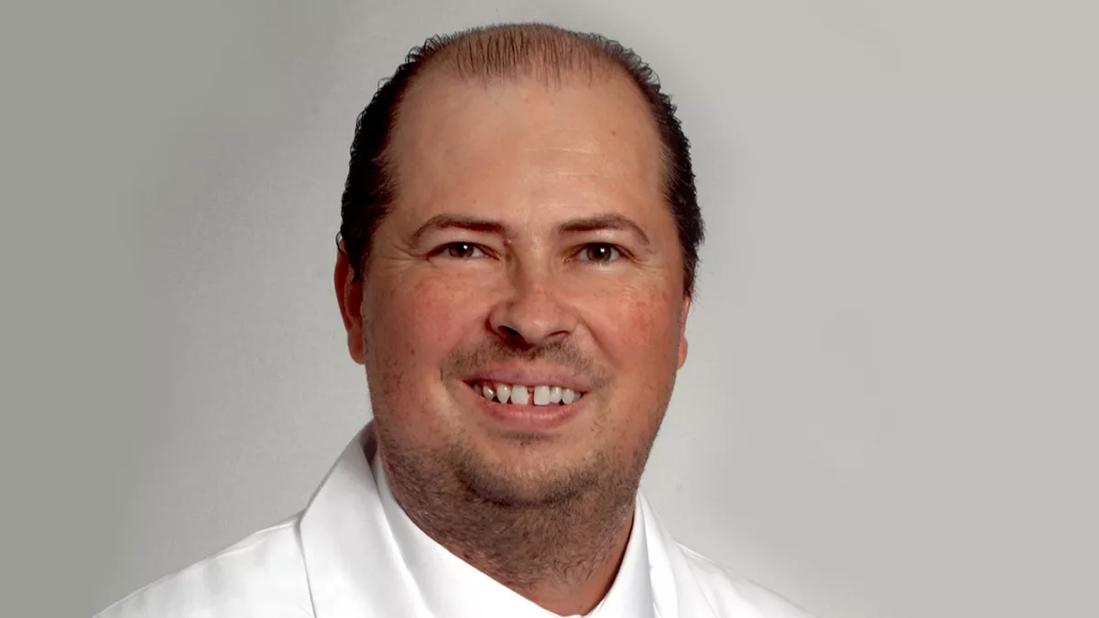
Physician-scientist Anatoly Nikolaev, MD, PhD, was recently awarded a Cleveland Clinic Caregiver Catalyst Grant supporting his efforts to identify and develop new, more effective therapies for oral squamous cell carcinoma (OSCC), specifically high-risk, human papillomavirus (HPV)-negative disease.
Advertisement
Cleveland Clinic is a non-profit academic medical center. Advertising on our site helps support our mission. We do not endorse non-Cleveland Clinic products or services. Policy
A board-certified radiation oncologist, Dr. Nikolaev specializes in head and neck cancer and central nervous system disease sites. In addition to caring for patients at Cleveland Clinic Indian River Hospital’s Scully-Welsh Cancer Center, he is engaged in leading-edge research at the Port St. Lucie-based Florida Research and Innovation Center (FRIC), with a focus on understanding the molecular mechanisms behind cancer treatment resistance.
More than 50,000 Americans are diagnosed each year with head and neck squamous cell carcinomas (HNSCC), the sixth most common cancer worldwide. These cancers typically begin in the squamous cells that line the surfaces of the oral cavity, pharynx, and larynx.
They are divided into two main groups. HPV-positive HNSCC is more common and considered low risk due to an overall survival rate of more than 90%. HPV-negative HNSCC, which is strongly linked with tobacco and alcohol exposure, has an overall survival rate of less than 40%.
“Studies have demonstrated the relative treatment resistance of HPV-negative head and neck cancer resulting in worse outcomes,” says Dr. Nikolaev. He points out that while radiation therapy combined with chemotherapy drug cisplatin significantly improves clinical outcomes for patients with OSCC compared to radiation alone, relapses still occur, especially in HPV-negative, high-risk cases that involve positive margins post-excision or extranodal extensions.
The molecular mechanisms responsible for poor treatment responses in HPV-negative OSCC remain poorly understood. It is this knowledge gap Dr. Nikolaev hopes to address by focusing on the tumor suppressor protein p53 (TP53), which he first began investigating while pursuing his PhD in cancer biology at Columbia University.
Advertisement
“TP53 mutations are present in more than half of human tumors, including head and neck cancer and certain brain cancers, and have been linked to poor response to conventional therapy and reduced survival,” he notes.
Known as the “guardian of the human genome,” the p53 gene codes for a protein responsible for keeping the human genome stable and counteracting genetic mutations. It blocks cancers from developing by identifying DNA damage and triggering DNA repair or cell death.
“On the molecular level, HPV-negative oral squamous cell carcinoma is believed to be caused by chemical carcinogenesis and mutations in the driver genes, the most common of which is TP53,” explains Dr. Nikolaev. “Not only do the mutations in TP53 gene cause a loss of normal tumor suppressor function of p53, they also result in tumor-promoting oncogenic effects.”
Today Dr. Nikolaev’s lab is using AI-driven computational approaches to discover novel mutant p53-targeting agents that may enhance radiation sensitivities in high-risk OSCC. These agents will then be tested for their therapeutic efficacy in preclinical models.
One of the drug candidates Dr. Nikolaev first identified during research as a radiation oncology resident, prior to joining Cleveland Clinic Florida, is a pyrido-indole benzoxazine (Tolistat-1). “We carried out a computational virtual screen of 3 million small molecule drug-like candidates to identify novel candidate compounds predicted to selectively target an allosteric site within mutant p53,” he describes.
Advertisement
Tolistat-1 showed growth inhibitory and radiation sensitizing effects in p53 mutant cancer cell lines, but not in p53 wildtype cells, which lack the mutation. It also induced cell cycle arrest and triggered apoptotic cell death in mutant p53 cells.
Since joining Cleveland Clinic Florida in 2021, Dr. Nikolaev and his team have screened more than 7 million compounds from the ZINC database, a curated collection of commercially available chemical compounds.
“We used pharmacophore modeling to compare the compounds in the database against Tolistat-1 to identify candidates with similar 3D molecular arrangements,” explains Dr. Nikolaev. “This resulted in the identification of a more potent derivative, identified as Tolistat-23, that displayed sub-micromolar efficacy in mutant p53 cancer cells.”
Based on this research, Dr. Nikolaev and Cleveland Clinic have filed for patents on drug compounds now under investigation in preclinical trials. His team is also working in conjunction with the Cleveland Clinic Center for Therapeutics Discovery in Ohio to identify and develop additional high potency drug candidates.
“Our next step is to test the hypothesis that mutant p53 targeting with Tolistat-1 and its derivative Tolistat-23 may synergize with therapeutic radiation in preclinical models,” says Dr. Nikolaev. “We will also work to establish the relationship between the chemical structure and biological activity of Tolistat derivatives in pursuit of achieving higher potency for future studies.”
Advertisement
Dr. Nikolaev says his ultimate goal is to conduct investigator-initiated clinical trials of novel p53-targeting agents in combination with radiation that may help improve clinical outcomes for patients with high-risk, HPV-negative OSCC.
Advertisement
Advertisement

The shifting role of cell therapy and steroids in the relapsed/refractory setting

Radiation therapy helped shrink hand nodules and improve functionality

Standard of care is linked to better outcomes, but disease recurrence and other risk factors often drive alternative approaches

Phase 1 study demonstrates immune response in three quarters of patients with triple-negative breast cancer

Multidisciplinary teams bring pathological and clinical expertise

Genetic variants exist irrespective of family history or other contributing factors

Study shows significantly reduced risk of mortality and disease complications in patients receiving GLP-1 agonists

Structured interventions enhance sleep, safety and caregiver resiliency in high-acuity units